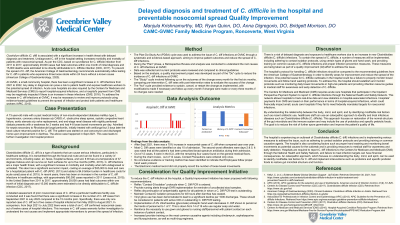Back

Health Policy
Delayed diagnosis and treatment of C. difficile in the hospital and preventable nosocomial spread QI
Friday, March 31, 2023
12:00 PM East Coast USA Time


Manjula Krishnamurthy, MD
Family Medicine Resident , PGY-2
GVMC
Lewisburg, West Virginia, United States
Presenting Author(s)
Introduction: This case leads to further investigation into hospital protocol. Clostridium difficile (C. diff) is associated with a significant increase in health threat with delayed diagnosis and treatment. Undiagnosed C. diff in the hospital setting increases morbidity and mortality of patients with nosocomial spread. As per the CDC approximately 29,000 cases had fatal outcomes within one month of initial diagnosis and 15,000 deaths in the United States. The American College of Gastroenterology recommends that patients who experience 3 loose stools within 24 hours without a known cause should automatically reflex to C. diff testing. We noticed in our small community hospital at GVMC a significant increase in C-Diff infection in one year from 2021-2022. Any delayed diagnosis poses a health risk for delayed treatment of the patient and improper contact isolation precautions expose healthcare workers to potential spread to themselves as well as other patients. Possible improvements in the protocols are suggested with evidence-based guidelines in the hospital setting.
Case Study: A 73-year-old male with a past medical history of non-insulin-dependent diabetes mellitus type 2, hypertension, coronary artery disease s/p CABG x1, obstructive sleep apnea, systolic congestive heart failure, aortic stenosis s/p valve replacement, and end-stage renal disease with nightly peritoneal dialysis presents with a weakness for 2 weeks and had 4-8 loose bowel movements per day. Admitted for sepsis secondary to Rhodotorula fungal peritonitis initially treated with antifungal but 3 days later stool culture found to be C. diff positive. The patient was started on oral vancomycin and discharged home upon improvement in diarrhea. This case leads to further investigation into hospital protocol.
Discussion: 1) Yes, relates to the tenants such as Body, Mind and Spirit
2) Rationale: Increase in new C. difficile infections may be an indicator of “poor adherence to environmental sterilization and other infection prevention measures.” Delayed diagnosis poses a health risk for delayed treatment and improper contact isolation precautions expose healthcare workers. Improvements in protocols are suggested with evidence-based guidelines in hospital setting.
3) To be done differently:
a) Hospital should establish & monitor protocols such as monitoring of daily bowel movements in patients with risk factors for C. diff.
b) Plan Performance improvements to discuss missed diagnoses and how to avoid them in the future.
c) Medical record flags for multiple loose bowel movements for implementation of contact isolation precautions.
d) Provide C. diff infection resource guides to medical staff for awareness, early detection with signs and symptoms.
Case Study: A 73-year-old male with a past medical history of non-insulin-dependent diabetes mellitus type 2, hypertension, coronary artery disease s/p CABG x1, obstructive sleep apnea, systolic congestive heart failure, aortic stenosis s/p valve replacement, and end-stage renal disease with nightly peritoneal dialysis presents with a weakness for 2 weeks and had 4-8 loose bowel movements per day. Admitted for sepsis secondary to Rhodotorula fungal peritonitis initially treated with antifungal but 3 days later stool culture found to be C. diff positive. The patient was started on oral vancomycin and discharged home upon improvement in diarrhea. This case leads to further investigation into hospital protocol.
Discussion: 1) Yes, relates to the tenants such as Body, Mind and Spirit
2) Rationale: Increase in new C. difficile infections may be an indicator of “poor adherence to environmental sterilization and other infection prevention measures.” Delayed diagnosis poses a health risk for delayed treatment and improper contact isolation precautions expose healthcare workers. Improvements in protocols are suggested with evidence-based guidelines in hospital setting.
3) To be done differently:
a) Hospital should establish & monitor protocols such as monitoring of daily bowel movements in patients with risk factors for C. diff.
b) Plan Performance improvements to discuss missed diagnoses and how to avoid them in the future.
c) Medical record flags for multiple loose bowel movements for implementation of contact isolation precautions.
d) Provide C. diff infection resource guides to medical staff for awareness, early detection with signs and symptoms.
